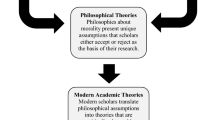Abstract
This paper shows how business ethics as a concept may be approached from a cognitive viewpoint. Following F. A. Hayek's cognitive theory, I argue that moral behavior evolves and changes because of individual perception and action. Individual moral behavior becomes a moral rule when prominently displayed by members of a certain society in a specific situation. A set of moral rules eventually forms the ethical code of a society, of which business ethics codes are only a part. By focusing on the concept of "limited" or "dispersed knowledge" that underlies the cognitive approach, I show that universal ethical norms that should lead to defined outcomes cannot exist. This approach moreover shows the limits of deliberate rule-setting. Attempts to deliberately impose universal ethical rules on societies may turn out to be harmful for societal development and lead to an abuse of governmental power.
Similar content being viewed by others
References
Arrow, K. J.: 1973, 'Social Responsibility and Economic Efficiency', Public Policy 21(3), 303–317.
Bauer, Lord P.: 1971, Dissent on Development Studies and Debates in Development Economics (Weidenfeld and Nicolson, London).
Bowie, N.: 2001, 'Relativism and the Moral Obligations of Multinational Corporations', in T. Beauchamp and N. Bowie (eds.), Ethical Theory and Business, 6th edition (Prentice Hall, New Jersey).
Hayek, F. A.: 1944/1994, The Road to Serfdom (University of Chicago Press, Chicago).
Hayek, F. A.: 1952, The Sensory Order (Routledge, London).
Hayek, F. A.: 1952/1979, The Counter–Revolution of Science (Liberty Fund, Indianapolis).
Hayek, F. A.: 1967, Studies in Philosophy, Politics, and Economics (University of Chicago Press, Chicago).
Hayek, F. A.: 1973, Law, Legislation and Liberty, Vol. 1 (University of Chicago Press, Chicago).
Hayek, F. A.: 1976, Law, Legislation and Liberty, Vol. 2 (University of Chicago Press, Chicago).
Hayek, F. A.: 1978, New Studies in Philosophy, Politics, Economics and the History of Ideas (Routledge, London).
Hayek, F. A.: 1979, Law, Legislation and Liberty, Vol. 3 (University of Chicago Press, Chicago).
Hayek, F. A.: 1982, 'The Sensory Order After 25 Years', in W. B. Weimer, D. S. Palermo (eds.), Cognition and the Symbolic Processes (Lawrence Erlbaum Associates, Hillsdale).
Hayek, F. A.: 1988, The Fatal Conceit (Routledge, London).
Lucas, J. R.: 1998, 'The Responsibilities of a Businessman', in C. Cowton and R. Crisp (eds.), Business Ethics (Oxford University Press, Oxford).
Popper, K. R.: 1966, The Open Society and its Enemies, Vol. 1 (Routledge, London).
Rizzello, S.: 1999, The Economics of Mind (Edward Elgar, Cheltenham).
Vromen, J. J.: 1995, Economic Evolution. An Enquiry into the Foundations of New Institutional Economics (Routledge, London).
Walker, G.: 1986, The Ethics of F. A. Hayek (University Press of America, Lanham, New York, London).
Weimer, W. B. and D. S. Palermo: 1982, Cognition and the Symbolic Processes (Lawrence Erlbaum Associates, Hillsdale).
Werhane, P. H.: 2000, 'Exporting Mental Models: Global Capitalism in the 21st Century', Business Ethics Quarterly 10(1), 353–362.
Woodward, S. N.: 1998, 'The Potential for a Universal Business Ethics', in C. Cowton and R. Crisp (eds.), Business Ethics (Oxford University Press, Oxford).
Yaeger, L. B.: 2001, Ethics as Social Science: The Moral Philosophy of Social Cooperation (Edward Elgar, Cheltenham).
Author information
Authors and Affiliations
Rights and permissions
About this article
Cite this article
Gick, E. Cognitive Theory and Moral Behavior: The Contribution of F. A. Hayek to Business Ethics. Journal of Business Ethics 45, 149–165 (2003). https://doi.org/10.1023/A:1024141017104
Issue Date:
DOI: https://doi.org/10.1023/A:1024141017104




